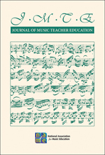
Journal of Music Teacher Education
Scope & Guideline
Innovating Practices for Tomorrow's Music Educators.
Introduction
Aims and Scopes
- Curricular Development in Music Education:
Focuses on innovative curricular practices and the integration of diverse educational philosophies into music teacher training programs. - Pedagogical Strategies and Practices:
Explores effective teaching strategies, including technology integration and culturally responsive pedagogy, to enhance music education. - Identity and Agency of Music Educators:
Examines the self-concept, agency, and professional identity of music educators, particularly in challenging or diverse educational settings. - Collaborative Learning and Professional Development:
Investigates collaborative approaches to teacher education, including mentorship, peer learning, and community-based projects. - Impact of External Factors on Music Education:
Analyzes how factors such as policy changes, social dynamics, and community engagement influence music teacher education and practice.
Trending and Emerging
- Culturally Responsive Pedagogy:
A growing emphasis on culturally relevant teaching practices that address diversity and inclusion in music education reflects broader societal movements toward equity. - Mental Health and Well-Being of Music Educators:
An increasing focus on the mental health challenges faced by music educators highlights the importance of self-care and well-being within the profession. - Technology Integration in Music Education:
Research exploring the use of technology in music education, including online learning and digital tools, has surged in response to evolving educational landscapes. - Narrative and Qualitative Research Methods:
There is a trend toward employing narrative and qualitative methodologies to explore the lived experiences of music educators, providing deeper insights into their challenges and successes. - Interdisciplinary Approaches to Music Education:
Emerging studies are increasingly integrating music education with other disciplines, reflecting a holistic approach to teaching and learning.
Declining or Waning
- Traditional Methods of Music Instruction:
Research focusing on conventional teaching methods appears to be waning, as the field increasingly embraces innovative, student-centered approaches. - Focus on Classical Music:
There is a noticeable reduction in studies centered exclusively on classical music pedagogy, with more attention shifting toward popular music and diverse genres. - Static Approaches to Teacher Evaluation:
Research on rigid or traditional teacher evaluation models is declining, indicating a shift toward more dynamic and formative assessment practices. - General Music Education Without Contextual Relevance:
Studies that do not address the specific contexts of music education, such as cultural relevance or community engagement, are becoming less frequent.
Similar Journals
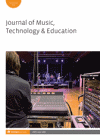
Journal of Music Technology & Education
Connecting the dots between music, technology, and pedagogy.Welcome to the Journal of Music Technology & Education, a leading academic journal dedicated to the intersection of music, technology, and pedagogical practices. Published by INTELLECT LTD in the United Kingdom, this journal has gained considerable recognition within the scholarly community, particularly noted for its strong rankings across multiple disciplines. As of 2023, it holds a prestigious Q1 quartile position in Music, Q2 in Education, and Q3 in Computer Science Applications, highlighting its multifaceted impact on various fields. Spanning over a decade from 2012 to 2023, the journal features rigorous peer-reviewed articles that explore innovative approaches to music education, technology integration in teaching practices, and advancements in digital music creation. Researchers, educators, and students alike will find valuable insights and cutting-edge research to keep them at the forefront of this rapidly evolving landscape. Access to the journal's content is available to a broad audience, making it a vital resource for anyone interested in the vibrant world of music technology.
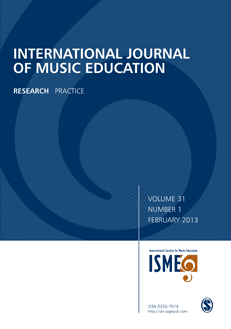
International Journal of Music Education
Championing research that resonates in classrooms worldwide.The International Journal of Music Education is a premier academic platform published by SAGE Publications Ltd, dedicated to exploring the interdisciplinary intersections of music and education. With its ISSN 0255-7614 and E-ISSN 1744-795X, this esteemed journal has been contributing significantly to the field since 1996 and will continue to do so through 2024, underscoring its commitment to advancing scholarly discourse in music pedagogy. It boasts impressive ranking metrics, including Q1 status in Music and Q2 in Education as of 2023, reflecting its influence within these domains. Ranked #10 out of 180 in Music (94th percentile) and #501 out of 1543 in Education (67th percentile) by Scopus, the journal is acknowledged for its rigorous peer-reviewed articles that address contemporary issues, innovative teaching strategies, and the role of music in learning environments. Although it does not offer open access, researchers, professionals, and students are encouraged to engage with its comprehensive research findings, ensuring the advancement of both music education and the broader arts landscape.
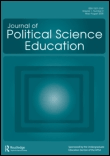
Journal of Political Science Education
Empowering Educators, Engaging MindsThe Journal of Political Science Education is a distinguished peer-reviewed journal published by Routledge Journals, Taylor & Francis Ltd, based in the United Kingdom. Since its inception in 2005, this journal has been dedicated to advancing research and discourse at the intersection of political science and education, offering insightful analyses and innovative pedagogical practices to enhance the teaching and learning of political science. As a reputable journal in the field, it is currently indexed in the Scopus database, holding a prestigious position within the top quartiles (Q2) in both Education and Sociology and Political Science categories. The journal aims to foster a vibrant scholarly community, encouraging contributions that promote critical thinking and engagement in political issues among students and educators alike. With an emphasis on accessibility and impact, the Journal of Political Science Education serves as a vital resource for researchers, educators, and practitioners seeking to enhance their understanding of the educational frameworks that shape political science knowledge and civic engagement.
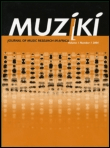
Muziki-Journal of Music Research in Africa
Fostering Dialogue Through Diverse Musical NarrativesMuziki - Journal of Music Research in Africa is a leading publication dedicated to exploring the rich tapestry of music research across the African continent. Published by Routledge Journals, Taylor & Francis Ltd, this journal has been at the forefront of scholarly discourse since its inception in 2004, providing a platform for innovative and interdisciplinary approaches to the study of music. With an ISSN of 1812-5980 and E-ISSN of 1753-593X, it ensures wide accessibility to both print and digital audiences. As of 2023, it holds a prestigious Q3 ranking in the field of Music, reflecting its commitment to quality scholarship and the promotion of diverse musical narratives. Muziki is particularly invaluable for researchers, professionals, and students seeking to deepen their understanding of African musicology and its socio-cultural relevance. The journal publishes original research articles, reviews, and critical essays, highlighting contemporary developments and historical contexts in music research. With a Scopus rank of 59/180 in the Arts and Humanities Music category, it stands as a respected source for advancing knowledge and fostering dialogue within the global music community.

Debates
Elevating Music Research in a Global ContextDebates is a pioneering journal published by PROGRAMA POS-GRADUACAO MUSICA-PPGM, dedicated to advancing scholarly dialogue in the field of music studies. With an ISSN of 1414-7939 and an E-ISSN of 2359-1056, Debates serves as a vital platform for researchers, professionals, and students to explore contemporary issues, theoretical frameworks, and interdisciplinary approaches within musicology. Located in the vibrant cultural backdrop of Rio de Janeiro, Brazil, this journal aims to foster critical discourse and cross-cultural understanding in music. Although currently not indexed in major databases, the journal is committed to contributing valuable insights to the academic community, making it an essential resource for those seeking to deepen their knowledge and engage with the latest trends in music studies.

Bordon-Revista de Pedagogia
Empowering educators through cutting-edge research.Bordon-Revista de Pedagogia is an esteemed peer-reviewed journal published by the SOC ESPANOLA PEDAGOGIA in Spain, dedicated to advancing the fields of education and developmental psychology. With an ISSN of 0210-5934 and an E-ISSN of 2340-6577, this journal features research that spans a wide spectrum of pedagogical theories, practices, and innovations. As indicated by its Q3 classification in both the Developmental and Educational Psychology and Education categories for 2023, it serves as a vital resource for academics and practitioners alike. The journal occupies an essential position in the Scopus rankings, demonstrating its growing influence in the social sciences, particularly in education, where it ranks #783 out of 1543. Researchers and professionals will benefit from the journal's commitment to publishing high-quality research and insights that foster pedagogical advancement. Operating without an open access model, Bordon provides a beneficial platform for scholarly discourse until 2024, encouraging collaborations and sharing of innovative educational practices.
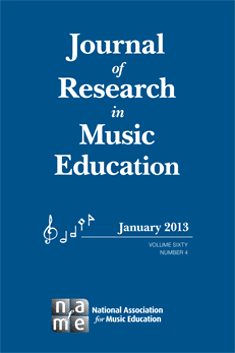
JOURNAL OF RESEARCH IN MUSIC EDUCATION
Fostering Excellence in Music PedagogyThe JOURNAL OF RESEARCH IN MUSIC EDUCATION, published by SAGE PUBLICATIONS INC, is a leading academic outlet in the field of music education, dedicated to advancing the study and understanding of music teaching and learning. With an impressive impact factor and classified in the Q1 category for both Education and Music, this journal plays a critical role in disseminating innovative research and insights that foster effective educational practices. Since its inception in 1953, it has maintained a rigorous peer-review process, contributing to its strong reputation within the academic community, as evidenced by its high rankings in Scopus. The journal's focus spans a wide range of topics, including pedagogical strategies, curriculum development, and the intersection of music and education policy, making it an essential resource for researchers, educators, and students alike. As it continues to evolve, users can explore a treasure trove of knowledge that supports the transformative power of music education in the 21st century.
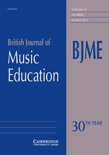
British Journal of Music Education
Advancing the Harmony of Music EducationBritish Journal of Music Education is a prestigious academic publication dedicated to advancing the field of music education. Published by Cambridge University Press, it benefits from a notable impact factor that positions it in the Q2 category in Education and the Q1 category in Music as of 2023. This journal serves as a vital platform for researchers, educators, and students alike, focusing on innovative research, pedagogical studies, and theoretical discussions that shape the practice of music education globally. Since its inception in 1984, the journal has contributed significantly to the understanding of music pedagogy and continues to be relevant and influential, currently spanning the years from 1984 to 1998 and 2007 to 2024. With impressive rankings, including rank #16/180 in Arts and Humanities (Music) and rank #669/1543 in Social Sciences (Education) on Scopus, it highlights the journal's commitment to scholarly excellence. Though it does not currently offer open access, its contributions are an essential resource for anyone involved in the education landscape of music.

Revista Electronica de LEEME
Empowering Global Dialogue in Music and Education.Revista Electronica de LEEME, published by UNIV RIOJA, DEPT EXPRESION ARTISTICA, is a distinguished open-access journal that has been a vital resource in the fields of education and music since its inception in 1998. With a strong presence in Spain and an impressive Q1 ranking in Music and Q2 in Education as of 2023, the journal has established itself as a leading platform for high-quality research in the Arts and Humanities. The journal’s Scopus ranks demonstrate its scholarly impact, particularly its ranking of 21 out of 180 in Music, showcasing an 88th percentile standing, while it holds the 838 out of 1543 position in Education, reflecting its critical relevance in this domain. Covering a diverse array of topics related to artistic expression and pedagogical innovation, the Revista Electronica de LEEME aims to enrich the academic landscape by promoting open scholarship and accessible knowledge sharing. Researchers, professionals, and students are encouraged to engage with its comprehensive articles and findings, which are available free of charge, fostering a global dialogue among scholars dedicated to advancing education and musicology.

TEACHING AND TEACHER EDUCATION
Empowering Educators, Shaping FuturesTEACHING AND TEACHER EDUCATION is an esteemed academic journal dedicated to advancing the fields of education and teacher training. Published by Pergamon-Elsevier Science Ltd, this journal has garnered substantial recognition, holding a prestigious Q1 category in Education as of 2023, and ranking #160 out of 1543 in Scopus's Social Sciences Education category, placing it in the top 89th percentile. Since its inception in 1985, the journal has been pivotal in disseminating cutting-edge research, theoretical developments, and practical applications for educators and policy-makers. The journal's scope encompasses a wide array of topics, including but not limited to pedagogical practices, teacher education curriculum, and innovative teaching methodologies. While it does not operate under an open access model, it remains influential by providing a critical platform for rigorous scholarship that impacts teaching practices globally. Located in the United Kingdom, TEACHING AND TEACHER EDUCATION is a vital resource for researchers, professionals, and students who are dedicated to shaping the future of education.